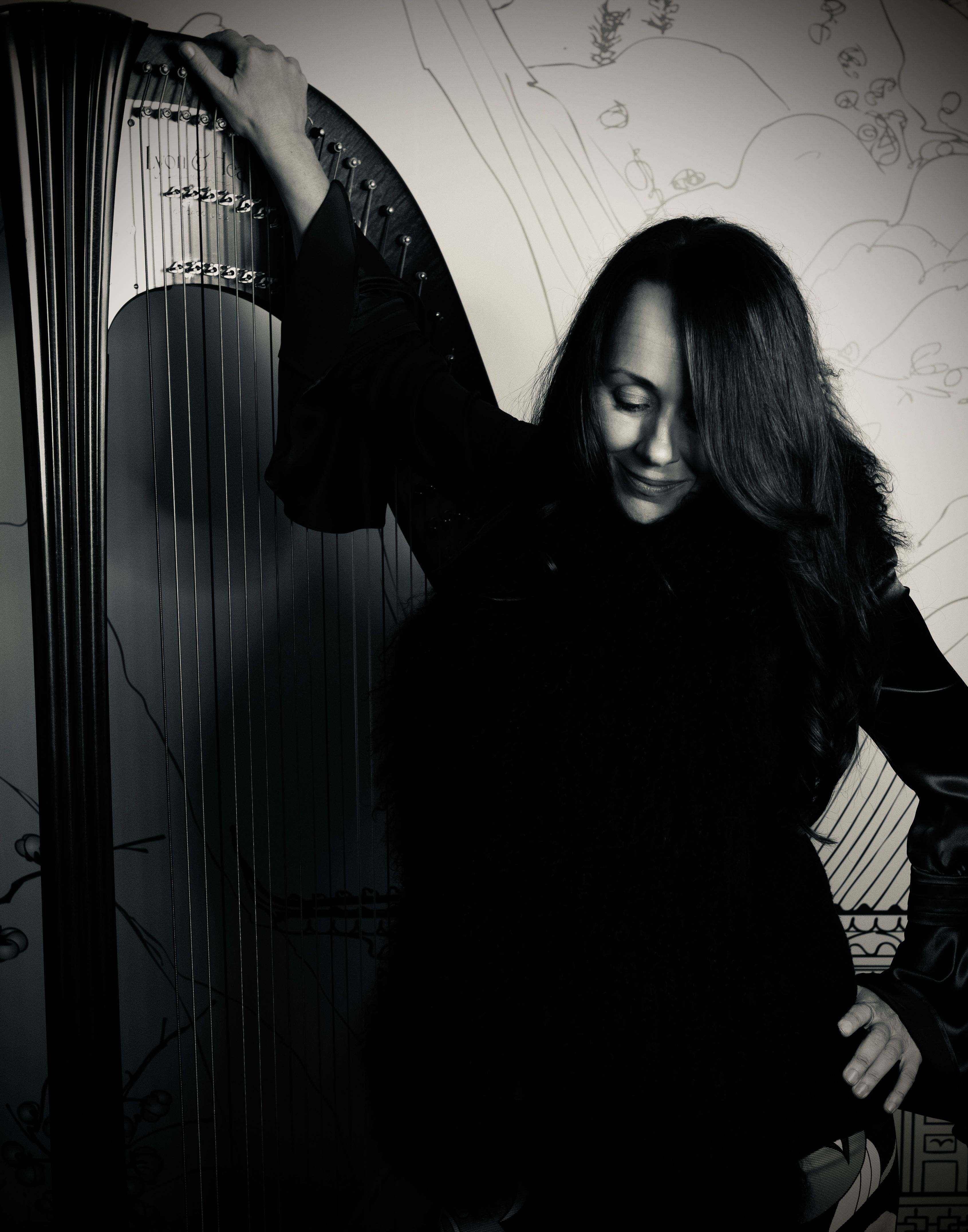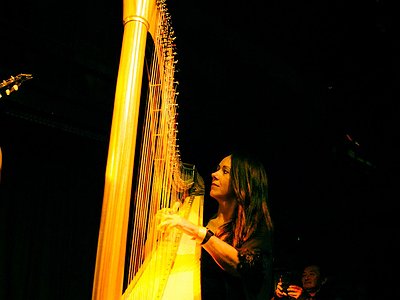Name: Amanda Whiting
Occupation: Harpist, composer
Nationality: British
Recent release: Amanda Whiting's The Liminality of Her is out via First Word.
Recommendations on the topic of sound: Go and listen … out in the forests, walks by the oceans. Listen to the birds talking. Feel how you feel in your body when a song resonates with you. Use music to help you through life. I personally couldn’t manage without it.
If you enjoyed this Amanda Whiting interview and would like to stay up to date with her music, visit her official homepage. She is also on Instagram, and Facebook.
When I listen to music, I see shapes, objects and colours. What happens in your body when you're listening? Do you listen with your eyes open or closed?
I like to listen with my eyes closed as removing one of my senses heightens the others. And so I don’t get distracted.
I definitely use music to relax myself or to stimulate myself. If I need to exercise, I’ll put on the Prodigy to get my enthusiasm up. Sat in the garden, I’ll be playing bossa nova or on a Sunday morning. I love to listen to some Puccini.
Music definitely has its soundtrack in our house. It’s playing constantly.
How do listening with headphones and listening through a stereo system change your experience of sound and music?
Playing music through headphones sends the music straight into your brain. Through the hi-fi there’s air in between you, it’s more of a holographic feel. It surrounds you, takes over you and you feel like the band is in the room with you.
We are a big hi-fi family and spending time just listening is a big part of our lives.
Tell me about some of the albums or artists that you love specifically for their sound, please.
It was recently when we were choosing a new speakers that I was completely taken back at the difference in production on the same album, just remastered. I was listening to Ahmed Jamal The awakening.
The original was like a comfortable pair of slippers and I much preferred it. The same album sounded completely different.
Norah Jones production is another standout. Her voice feels like she’s right in front of you.
When you start hearing the difference in sound, it’s very hard to unhear it.
Do you experience strong emotional responses towards certain sounds? If so, what kind of sounds are these and do you have an explanation about the reasons for these responses?
It’s strange you ask this, recently I was in a yoga class and somebody started playing the singing bowl and it was the note C. I had the most incredible allergic reaction to it and started crying uncontrollably. I have no idea what happened but it was immediate and strong. I’ve never experienced anything like it.
I also had an experience recently when mixing my album, The liminality of her, when a master came back and something had changed and it was hitting me in my throat, I didn’t like it. I spoke to Chris my producer and asked him what he had done within the music and he had changed something small which had to be undone.
Frequencies in music can cause all sorts of reactions. The chakras in the body resonate differently according to your sensitivity and mood that day. It’s weird.
I love the key of the minor and the note D resonates massively with me. A lot of my music is in D minor for this reason I’m just drawn to it. (liminal)
There can be sounds which feel highly irritating to us and then there are others we could gladly listen to for hours. Do you have examples for either one or both of these?
I love the sound of the marimba. It’s instantly soothing. Spanish guitar takes me somewhere sunny and a tenor saxophone transports my soul to another place.
I’ve realised I don’t like shepherd tones, they cause a real feeling of despair and doom. Ascending and descending. Anything that doesn’t resolve is like cruelty to my ears
Are there everyday places, spaces, or devices which intrigue you by the way they sound? Which are these?
Not that I’ve noticed.
Have you ever been in spaces with extreme sonic characteristics, such as anechoic chambers or caves? What was the experience like?
There are two places that come to mind, the great pyramid in Egypt and the Taj Mahal. The chamber in the top of the pyramid was very special and not something I can easily explain. But it stayed with me. It was an eerie tone that felt spiritual.
[Killing Joke's "Exorcism" was recorded in the King's chamber of the Great Pyramid]
The Taj Mahal had the most incredible reverberation (apparently it’s 28 seconds). Your words just hung in the air like clouds.
What are among your favourite spaces to record and play your music?
I think every musician enjoys a good concert hall where you don’t have to make any effort for your instrument to just sing. You can relax and let the music take care of itself.
There is nothing worse than when you are amplified and in a busy band and you can’t hear yourself or control your instrument. You play differently. It’s not your voice.
Having such a delicate instrument in the world of jazz, it’s constantly a battle to have good amplification and not be forced to overplay.
Do music and sound feel “material” to you? Does working with sound feel like you're sculpting or shaping something?
I recently embarked upon a sound course, and it blew my mind how many unknowns and variables there are. You can completely change the outcome by manipulating it in software. Sculpting, changing, shaping the music. I actually find this quite scary.
I’m somebody who likes to record and have back what I put in. But when you realise how much better it can sound, it’s hard to avoid. 
Amanda Whiting Interview Image by Kalpana Tagore
How important is sound for our overall well-being and in how far do you feel the "acoustic health" of a society or environment is reflective of its overall health?
Gosh, this is a big question.
Music has been with me since I was a little girl. I see the deterioration of this at grass root levels in schools. Children are more inclined to play video games. Funding for music lessons has disappeared and children are not experiencing orchestras and groups and the joys that these things bring at such an early age.
Music can allow a child who is academically challenged to excel creatively. It can build confidence and help them socially. In old age, music can help with keeping the mind sharp.
It shouldn’t be optional. It’s a part of our being. Our acoustic health is being severely challenged at this moment in time ... and it’s a worry!
Sound, song, and rhythm are all around us, from animal noises to the waves of the ocean. What, if any, are some of the most moving experiences you've had with these non-human-made sounds?
I live in Wales, surrounded by forests and natural beauty.
We have an abundance of birds in our hedge and the forest on my back doorstep. It is full of the most beautiful sounds of the trees, rustling and the birds singing with the trickling of streams as we walk over crunchy leaves. 20 Minutes drive to our beaches and we can stand and listen to the ocean.
This is my daily acoustic healing. I never take it for granted.
Many animals communicate through sound. Based either on experience or intuition, do you feel as though interspecies communication is possible and important? Is there a creative element to it, would you say?
In our house, we have a fish tank and there’s a variety of fish called Bangi Cardinals which click at each other. You can hear them in the night as they are nocturnal. This fascinates me. Of all the species, you wouldn’t expect fish to be talking to each other.
We know so little about communication verbally in the animal kingdom yet I think it’s something we are all intrigued by.
Tinnitus and developing hyperacusis are very real risks for anyone working with sound. Do you take precautions in this regard and if you're suffering from these or similar issues – how do you cope with them?
It’s recently that I’ve noticed some tinnitus. It’s been happening more since working with loud bands. I do try and wear earplugs but this can sometimes be difficult when you need to hear each other. A simple trio rehearsal with drums and bass and forgotten earplugs, you soon know about it!
I was quite interested when my Apple Watch showed me that I was above the acceptable sound level when I was simply practising my harp. I think we just get used to noises at certain levels.
We can surround us with sound every second of the day. The great pianist Glenn Gould even considered this the ultimate delight. How do you see that yourself and what importance does silence hold?
I am somebody who struggles with silence. It was, when I embarked on my jazz course, and the path of improvisation, that I soon realised the moments of silence were just as important as moments of playing.
In jazz, especially, it’s easy to over play in order to hold onto the beat, and it’s the moments of silence where you feel most vulnerable.
I need to find more silence as I feel uncomfortable ... hopefully this might improve as I age.
Seth S. Horowitz called hearing the “universal sense” and emphasised that it was more precise and faster than any of our other senses, including vision. How would our world be different if we paid less attention to looks and listened more instead?
Wouldn’t that be nice! Sadly society has set up the visual as being extremely dominant. Life would be easier if it wasn’t!





